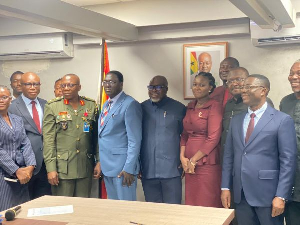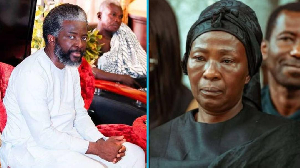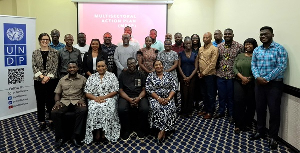By Ato Aidoo
Reports quoting Ghana’s President, John Evans Mills as saying that “God is the Leader of his government” is nothing new, but a mockery of good governance and God’s active involvement in the human world - it is a socio- political tactic crafted by the country’s first president and Pan-African hero- Kwame Nkrumah.
Political watchers should keenly follow this appetite for divine distortion because it has an antecedent derived from Nkrumaism- a combination of traditional African culture and Marxist socialism, which was orchestrated through political patronage, and the Convention People’s Party (CPP). Ghana’s president- John Mills is a self-confessed believer in CPP’s ideology. It is on record that the CPP relied on Christian symbols, terms, titles (Osagyefo is one of them), and imagery to consolidate power while popularizing Nkrumaism through a dose of religious deception.
Followers of Nkrumah and the CPP used religion as an instrument of ideological subversion to authenticate a political agenda. It was also aimed at winning philosophical support from the masses (Simms 2003). In essence, Christianity was used as a decoy; and it is important Ghanaians reject this trend, which targets the application of God’s name to gain something desirable. If not checked, the country can be divided.
President Mills would not apologize for turning the “seat of government” into a church. And why the use of the word “church”? Do all Ghanaians worship God at a church? How about those who worship at a mosque, or temple? And believers of African traditional religion who go to the shrine? Sometimes, it is prudent that leaders do not respond to every criticism.
Religious symbolism/pronouncements can trigger a society’s destruction, especially when a leader consciously “uses or misuses” the name of God or “church” to sustain power, and a political lifeline. CPP, the party of Nkrumah, its ideals, for which Ghana’s president, John Mills, has a strong attachment, followed a similar pattern when capitalizing on people’s sensibilities, their respect for religion, and the “Fear of God”.
We should also remind ourselves of how Kwame Nkrumah’s political party used the mass media to deify him. Unlike his mentor (Kwame Nkrumah) who was compared to a Messiah, in this instance, Jesus Christ, Ghana’s John Evans Mills has not claimed same, but it is glaring, this antecedent to political “Messiahship”, against the backdrop of misplaced priorities, and the sorry state of our economy. The fundamental demands of life have been put on hold as a result of unpredictable circumstances, and government ineptitude, and gradually religion is being used to confuse the people. Ghanaians should not relate to this lengthy propaganda, typified by the same political gimmicks engineered by Kwame Nkrumah, and how his party and the media connived to mollify the good people of Ghana. This injustice to humanity is well kept in Ghana’s political archives.
An editorial dated February 4, 1960, which appeared in the “Evening News”, a newspaper founded and operated by the CPP, stated, “the whole phenomena of Nkrumah’s emergence is second to none in the history of the world’s Messiahs- from Buddha and Muhammad to Jesus Christ”. It quoted the Bible with another reference to Christ, “If with all sincere adherence to the party’s principles, anybody says ‘they are filled with new wine’ (Acts 2:13), let them rejoice for so were the Apostles of Christ persecuted, even unto death” (Simms 2003)
Far-reaching analysis of the original CPP’s political acumen mirrors Kwame Nkrumah’s aura of invincibility and botched spirituality. And it appears Ghana’s current president is learning his trade from the excesses of this political pontification.
Subsequently, in two other articles that appeared in the “Evening News” of March 29 and April 29, 1960 with the banner headline - “This is our Messiah- Kwame Nkrumah in the hour of transfiguration”, this pro-CPP newspaper politicized a New Testament story of “Jesus Christ, when He went up into a high mountain, and was transfigured as He counseled with Moses and Elias”, the venerated prophets of the Old Testament. This was extensively used to glorify Nkrumah. (Simms 2003)
The Convention People’s Party’s indelible appeal and the use of God and Christianity endangered political discourse, and were part of Ghana’s post-independence problems. The usage of God’s name became ineffective, and “Lord Almighty “became an epithet for Nkrumah. This was to be accepted by his followers, as the CPP brands itself as a God-ordained political party, its leader- a Messiah.
The CPP also adopted a pre-independence “Lord’s Prayer”, which was used to justify its actions:
“O imperialism which are in Gold Coast, his grace is thy name, Thy Kingdom go/Our will be done in Gold Coast/As it is done in Britain/Give us this day our full self-government/And forget about the infringement of charges/Against our leaders, as it is done to you when you advocated for independence from the Romans/And lead us not into fear, /But deliver us from evil/For Ghana is glorious land, /for ever and ever” (Poobe 1984).
This prayer, sanctioned by the party, facilitated so-called divinely inspired actions, successes, inactions, and brutalities of Nkrumah’s regime. Perhaps, what the CPP failed to do was to inquire further whether Nkrumah really had an unblemished relationship with God. And why would they have done that, having declared him “second to none”? The part he played in the independence struggle notwithstanding, Nkrumah’s other side was a combination uncompromising leadership and chauvinism, perceived as it were, as being inspired by God Almighty, fallible as he was. To the CPP, any criticism of Nkrumah was a sin against a “Messiah”.
Nkrumah’s optimism and some of his policies were fundamentally imprudent and they misled him. His failure to act, even on promises to root out corruption within his own party, civil service, and wider society were to become critical factors and major contributors to the “beginning of his end” ( Biney 2009). This is the conviction that must guide our leaders who, so far, have been economical with self-analysis, of policies, their actions and inactions.
As a country with a political history immersed in controversies and deception, our recognition that there have been some success in maintaining peace may not be enough. The mentality has been one of “old whisky in a new bottle”. Instead of being good, it is sour, as we keep deceiving ourselves into believing that we are on the right track. We continue to use God’s name as a cover up for leadership inefficiency and economic hardship. This cannot, by any imagination, stand the test of time. A careful reminder is that Kwame Nkrumah, though was immortalized by what he claimed were justified, never saw nothing wrong with what he unleashed to people who disagreed with some of his policies, and petti-coat style of governance.
Great as many have said he was Nkrumah was also intoxicated by the desire for power, as he closes his mind to democratic principles when declaring himself Ghana’s president-for-life, supported by the CPP, and a mass media sympathetic to his “no-nonsense” approach to governance. Unfortunately, Nkrumah did not live to witness his utopian agenda.
When the realities of governance come to the fore, lessons for the present government of Ghana would be boldly written – that Osagyefo Kwame Nkrumah tried all the political tricks with a population of less than 6 million, it did not work. As Nkrumah became more alienated, and out of touch with the reality, his exit from the political arena should rather serve as another painful reminder to all, that no politician can use spirituality to hold on to power.
That applying the name of God as a propaganda tool induces undesirable results. It only “fertilizes” perceptions, and the potency dwindles with time because many people would even refuse to go to church when they do not have jobs, and cannot afford basic necessities of life.
As we prepare for meaningful changes ahead, we should not pretend we understand all the wrongs inherent in our politics. We should apprehend these problems just as much as we feel about our leaders. We may only know half of the truth, but once we are honest to ourselves, it would create a better understanding of the inadequacies and challenges facing our people. People would understand the leadership gap, that one day may be a true “messiah” would emerge to transform the lives of our people devoid of this celestial trickery.
Author: Formerly of the Features Desk, Daily Graphic, Accra, Ghana
Source: Aidoo. Ato
Opinions of Sunday, 20 March 2011
Columnist: Aidoo, Ato














